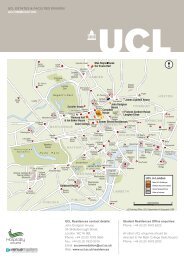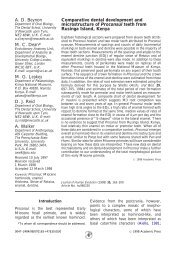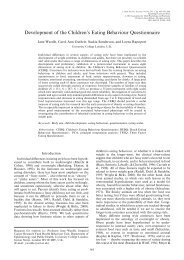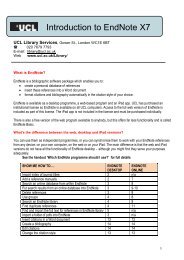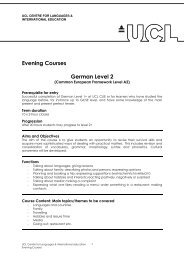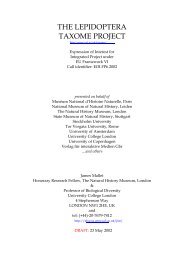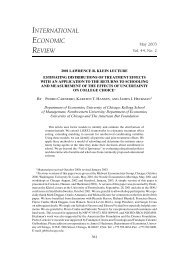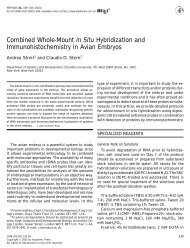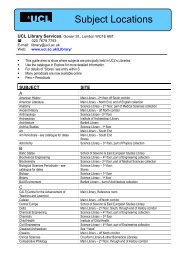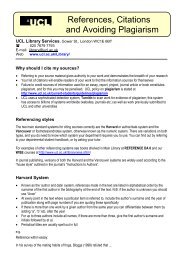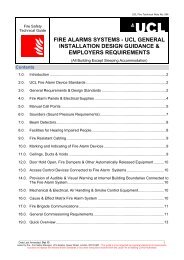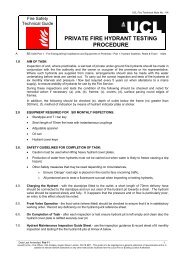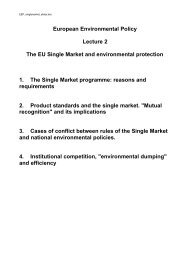Temporary Migration, Human Capital, and Language Fluency ... - UCL
Temporary Migration, Human Capital, and Language Fluency ... - UCL
Temporary Migration, Human Capital, and Language Fluency ... - UCL
You also want an ePaper? Increase the reach of your titles
YUMPU automatically turns print PDFs into web optimized ePapers that Google loves.
302 C. Dustmann<br />
H upon arrival increases opportunity costs of investments in period 1. The<br />
total effect depends on how productive H is in human capital production,<br />
<strong>and</strong> on the rate r H .<br />
An increase in the contract length ô increases human capital investment as<br />
long as the rate of return on produced human capital is higher in the host<br />
country (r H . r S ). This may be considered the normal case for labour<br />
migrations. Accordingly, shorter contracts imply lower investments in host<br />
country speci®c human capital. Finally, an increase in T increases human<br />
capital investments, as long as r S . 0. For a population of migrants with the<br />
same contract length, investments should therefore be higher for those who<br />
arrive at younger ages.<br />
Return <strong>Migration</strong><br />
Turning to migrations where the migrant chooses the return point optimally,<br />
the analysis becomes slightly more involved. Using (2c) <strong>and</strong> the<br />
budget constraint, both s <strong>and</strong> ð may be written as functions of the return<br />
point ô, which is then determined by (2b). 4<br />
The term on the LHS of (2b) denotes the cost of remaining one further<br />
unit of time in the host country in terms of forgone utility. The term on the<br />
RHS is the marginal bene®t from remaining a further unit of time in the host<br />
country. If return is induced by a higher marginal utility from consumption<br />
in the home country, or by a higher purchasing power in the home country<br />
( p , 1), 5 these costs are positive (u S c (k) uH c (k) . 0). The migrant returns<br />
when costs are equal to bene®ts, so (2b) becomes an equality at the optimal<br />
return point ô.<br />
The third reason for a return relies solely on human capital considerations.<br />
If the migrant is indifferent between consumption in the host <strong>and</strong> the<br />
home country, <strong>and</strong> if p ˆ 1, then (2b) reduces to [r H r S ]H<br />
‡ [r H r S ] f . Still, a temporary migration may be optimal also in this<br />
case. The ®rst term in brackets (r H r S ) should always be positive,<br />
re¯ecting a higher rent on human capital upon arrival (H) in the host than<br />
in the home country. The second term is positive if the rent on human<br />
capital acquired in the host country is higher in host than in home country<br />
4 The optimal consumption ¯ows c S <strong>and</strong> c H can be expressed as functions of ð, which follows<br />
from (2a).<br />
5 There are a number of reasons why the host country currency may have a higher purchasing<br />
power in the migrant's home country. For instance, if wages are higher in the host country,<br />
non±traded goods <strong>and</strong> services tend to be less expensive in the home country. Furthermore,<br />
migrants may have different consumption patterns, due to cultural or religious differences.<br />
Some essential goods may be more expensive in the host than in the home country, since they<br />
have to be especially imported.<br />
# The editors of the Sc<strong>and</strong>inavian Journal of Economics 1999.



